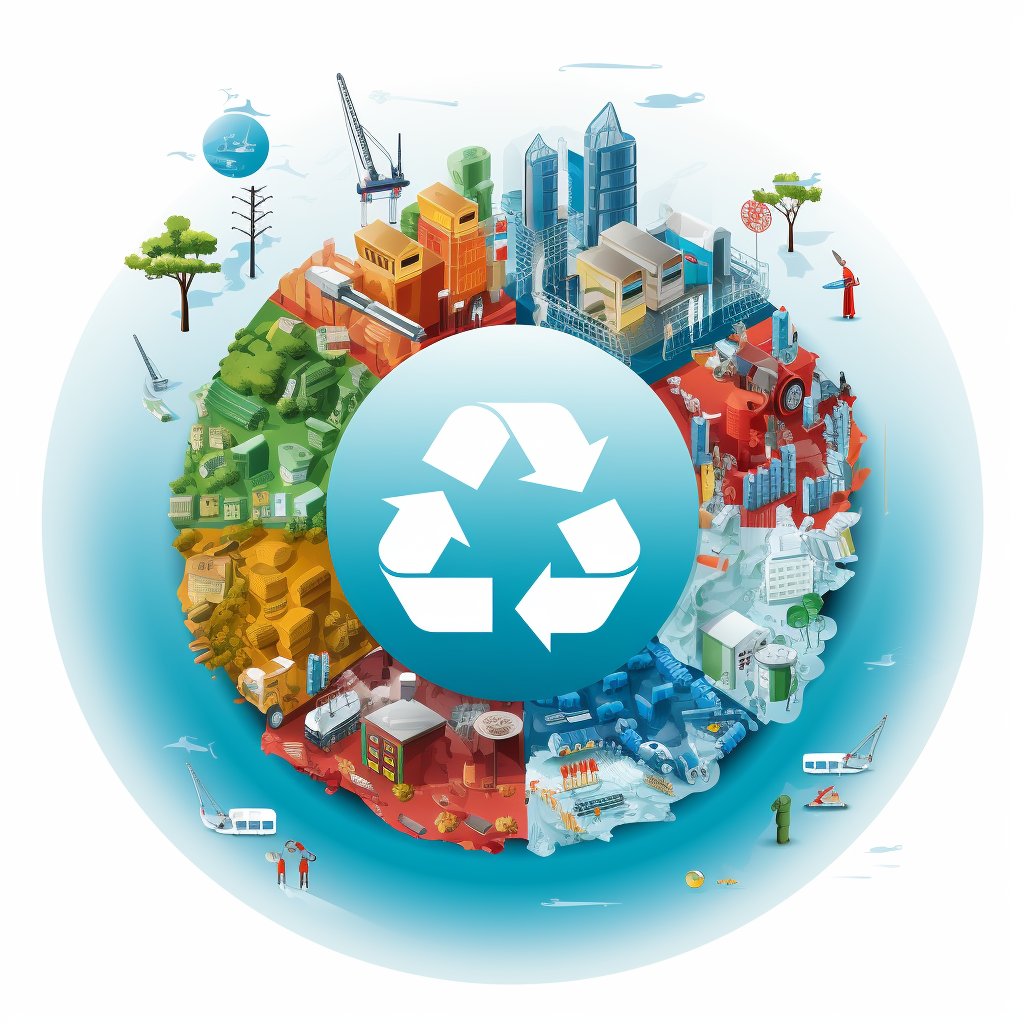Mass Balance tracking for chemical recycling is essential to modern waste management practices. The demand for sustainable products and reducing waste has resulted in the need for effective recycling processes. The Mass Balance approach provides a unique way to track the input and output of recycled materials during chemical recycling.

What is Mass Balance?
Mass Balance is a systematic approach that tracks the movement of materials in and out of a system, ensuring that the overall mass balance is conserved. In chemical recycling, Mass Balance is used to track the input and output of recycled materials to ensure that the overall mass balance of the system is maintained.
With the rise in environmental concerns and the need for sustainable waste management practices, the recycling industry has seen a surge in innovation and development in recent years. One promising technique that has gained attention is Mass Balance tracking for chemical recycling. This technique involves the chemical transformation of waste materials into high-quality recycled products, enabling the recycling of a broader range of materials and promoting a more closed-loop approach to waste management.
Different Mass Balance tracking techniques:
-
Physical Separation:
Physical Separation is a Mass Balance tracking technique used in chemical recycling, where the recycled material is physically separated from the waste. This technique is mainly used for plastic waste recycling, where the waste plastic is shredded and physically divided into different categories based on their composition.
-
Energy Recovery:
Energy Recovery is another Mass Balance tracking technique used in chemical recycling. This approach involves using thermal or chemical processes to convert the waste material into valuable energy. The energy produced is then used to power other industrial processes, thereby reducing the overall carbon footprint of the process.
-
Chemical Recycling:
Chemical Recycling is a Mass Balance tracking technique that uses chemical processes to break down the waste material into its basic building blocks. The building blocks are then reassembled into new products, ensuring that the overall mass balance of the system is maintained.
Industrial Usage:
Mass Balance tracking is widely used in the plastics industry, where plastic waste is a significant problem. Physical separation and chemical recycling techniques are commonly used in the industry to ensure the efficient recycling of waste plastic.
Application Areas:
Mass Balance tracking is essential in various application areas, including packaging, construction, and electronics. These sectors generate a considerable amount of waste, and Mass Balance tracking techniques are used to ensure that the waste is efficiently recycled.
Consumer Product Examples:
Consumer products made from recycled materials are becoming increasingly popular. Products such as recycled plastic bags, recycled paper, and recycled clothing are examples of products made using Mass Balance tracking techniques.
Material Properties:
The Mass Balance tracking techniques used in chemical recycling ensure that the properties of the recycled materials are consistent with the original materials. This ensures that the recycled materials can be used in the same applications as the original materials.
Market Price Developments:
Mass Balance tracking for chemical recycling is becoming increasingly popular due to the growing demand for sustainable products and reducing waste. This has led to an increased in the market price of recycled materials as companies look to meet the demand for sustainable products. The cost of recycled materials is influenced by various factors such as supply and demand, quality of recycled materials, and government regulations.
Global Impact:
Mass Balance tracking for chemical recycling has a significant global impact, as it reduces the amount of waste sent to landfills and helps conserve natural resources. The efficient recycling of waste materials also reduces greenhouse gas emissions, contributing to the fight against climate change. The global impact of Mass Balance tracking for chemical recycling is likely to continue to grow as more countries adopt sustainable waste management practices.
Future Market Prognosis:
The future of Mass Balance tracking for chemical recycling looks promising as the demand for sustainable products and reducing waste continues to grow. The market is expected to expand as more companies adopt sustainable waste management practices and governments introduce regulations to promote recycling. The future market prognosis for Mass Balance tracking for chemical recycling is expected to be positive, with increased adoption of new recycling techniques and the development of circular economy models.
Mass Balance tracking for chemical recycling is essential to modern waste management practices. The demand for sustainable products and reducing waste has resulted in the need for effective recycling processes. The Mass Balance approach provides a unique way to track the input and output of recycled materials during chemical recycling.
What is Mass Balance?
Mass Balance is a systematic approach that tracks the movement of materials in and out of a system, ensuring that the overall mass balance is conserved. In chemical recycling, Mass Balance is used to track the input and output of recycled materials to ensure that the overall mass balance of the system is maintained.
With the rise in environmental concerns and the need for sustainable waste management practices, the recycling industry has seen a surge in innovation and development in recent years. One promising technique that has gained attention is Mass Balance tracking for chemical recycling. This technique involves the chemical transformation of waste materials into high-quality recycled products, enabling the recycling of a broader range of materials and promoting a more closed-loop approach to waste management.
Different Mass Balance tracking techniques:
Physical Separation is a Mass Balance tracking technique used in chemical recycling, where the recycled material is physically separated from the waste. This technique is mainly used for plastic waste recycling, where the waste plastic is shredded and physically divided into different categories based on their composition.
Energy Recovery is another Mass Balance tracking technique used in chemical recycling. This approach involves using thermal or chemical processes to convert the waste material into valuable energy. The energy produced is then used to power other industrial processes, thereby reducing the overall carbon footprint of the process.
Chemical Recycling is a Mass Balance tracking technique that uses chemical processes to break down the waste material into its basic building blocks. The building blocks are then reassembled into new products, ensuring that the overall mass balance of the system is maintained.
Industrial Usage:
Mass Balance tracking is widely used in the plastics industry, where plastic waste is a significant problem. Physical separation and chemical recycling techniques are commonly used in the industry to ensure the efficient recycling of waste plastic.
Application Areas:
Mass Balance tracking is essential in various application areas, including packaging, construction, and electronics. These sectors generate a considerable amount of waste, and Mass Balance tracking techniques are used to ensure that the waste is efficiently recycled.
Consumer Product Examples:
Consumer products made from recycled materials are becoming increasingly popular. Products such as recycled plastic bags, recycled paper, and recycled clothing are examples of products made using Mass Balance tracking techniques.
Material Properties:
The Mass Balance tracking techniques used in chemical recycling ensure that the properties of the recycled materials are consistent with the original materials. This ensures that the recycled materials can be used in the same applications as the original materials.
Future Trends in Recycling:
The demand for sustainable products and reducing waste will continue to drive innovation in the recycling industry. New techniques, such as chemical recycling and circular economy models, are being developed to ensure the recycling process is more efficient and sustainable.
Market Price Developments:
Mass Balance tracking for chemical recycling is becoming increasingly popular due to the growing demand for sustainable products and reducing waste. This has led to an increased in the market price of recycled materials as companies look to meet the demand for sustainable products. The cost of recycled materials is influenced by various factors such as supply and demand, quality of recycled materials, and government regulations.
Global Impact:
Mass Balance tracking for chemical recycling has a significant global impact, as it reduces the amount of waste sent to landfills and helps conserve natural resources. The efficient recycling of waste materials also reduces greenhouse gas emissions, contributing to the fight against climate change. The global impact of Mass Balance tracking for chemical recycling is likely to continue to grow as more countries adopt sustainable waste management practices.
Future Market Prognosis:
The future of Mass Balance tracking for chemical recycling looks promising as the demand for sustainable products and reducing waste continues to grow. The market is expected to expand as more companies adopt sustainable waste management practices and governments introduce regulations to promote recycling. The future market prognosis for Mass Balance tracking for chemical recycling is expected to be positive, with increased adoption of new recycling techniques and the development of circular economy models.
Mass balance tracking:
Mass Balance tracking is an essential aspect of chemical recycling, and the techniques used ensure that the overall mass balance of the system is maintained. The industrial usage, application areas, consumer product examples, material properties, and future trends in recycling demonstrate the importance of Mass Balance tracking in the recycling industry. As the demand for sustainable products increases, Mass Balance tracking techniques will continue to evolve, ensuring that the recycling is more efficient and sustainable.






